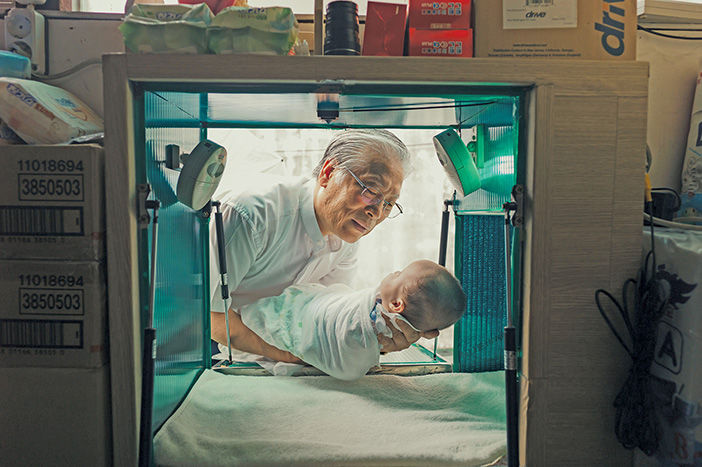For most film school students, a successful project means creating a compelling movie that is skillful enough to draw a good grade and maybe even an agent. But for Brian Ivie, making the student short that evolved into the full-length documentary “The Drop Box” changed his life.
Ivie’s immersion into the world of his subject, South Korean pastor Lee Jong-rak, inspired him to become a Christian himself. Seeing Jong-rak’s selfless devotion to finding a home for his nation’s abandoned — and often disabled — children lit a fire in Ivie that led to his conversion a year after beginning the project.
“I read about Pastor Lee in a Los Angeles Times article on June 20, 2011, all about a man in South Korea who had put a mailbox for abandoned babies in his church and cared for them. I thought it looked like the bunker of a man who had drawn a line in the sand and said, ‘No one dies here.’ I wanted to make the movie so no one would forget his work when the article faded.”
The initial short film evolved into a full-length documentary that completed a three-day screening run nationwide in early March. Although no longer available for viewing on the big screen, the film is being licensed for church screenings.
At the time he started working on the short version of “The Drop Box,” Ivie was just a regular college student, “a nice guy with a lot of hidden things in my life.” He struggled with pornography and had what he describes as “anger issues and abusive relationships.”
“I was a pretty good guy by most people’s terms still, but you don’t get saved without repenting and asking forgiveness,” says Ivie. “A little boy recently asked me my biggest mistake, and I said that I had thought I was too good to need God’s forgiveness, and thought that sin was just a normal part of being a human being.”
Ivie first reached out to Jong-rak through email, and a month later he received a reply inviting the young filmmaker to live with the pastor and see his work in action. Three months later, Ivie arrived in Seoul with a team of friends as his film crew, embarking on his first trip outside the U.S., aside from a Mexican cruise.
He was astonished by what he saw at Jong-rak’s church and mission, surrounded by children whose parents had abandoned them because of cultural stigmas against disabled children. Many see them as signs of a curse upon their parents.
Seeing Jong-rak and his team of helpers care for such children in their most vulnerable state soon led to deeper thoughts about his own life and its purpose.
“It was a link in a chain, the pastor being proof of a loving God,” says Ivie, who is now 24 and engaged in film as his career. “It helped me realize I didn’t have to hate myself for my sins but that God wanted me to be debt free. My brother got saved as well, and he was the closest to an atheist I’ve ever seen, so that was pretty miraculous. Other friends on the trip maybe didn’t get saved, but the experience changed their lives.”
Ivie notes that his conversion came about eight months into the making of his short student film, and after his transformation, he decided to return to Seoul and remake the film through his new Christian perspective. While he originally envisioned a film that would be 10 minutes maximum, he feels that God inspired him to instead make an 80-minute feature with many added points.
He has been pleasantly surprised to find that his USC professors supported his efforts. He was later surprised that the national Christian organization Focus on the Family chose to support him as he expanded the film’s scale. Focus financed his final trip to South Korea.
“Focus on the Family and I call it a documentary on life,” says Ivie. “I think the most powerful part of [Pastor Jong-rak’s] work is him helping people not to abandon or abort their babies. He says he will embrace your suffering with you and bring the children in, that you are valuable and so is your childhood. This is a picture that asks: what if one family or man embraced others who are suffering and said we will embrace you and it grew from there? I think that could change the world."

